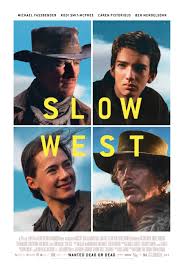 Lying on the ground in the Old West, a naïve boy and a grizzled bounty hunter look up to the moon and constellations in the night sky. The boy cocks his fingers into a gun and shoots holes in the heavens, and the bounty hunter says that when we finally get to the moon, the first thing we’re likely to do is kill all the natives that live there. Even space is a reflection of their bleak reality.
Lying on the ground in the Old West, a naïve boy and a grizzled bounty hunter look up to the moon and constellations in the night sky. The boy cocks his fingers into a gun and shoots holes in the heavens, and the bounty hunter says that when we finally get to the moon, the first thing we’re likely to do is kill all the natives that live there. Even space is a reflection of their bleak reality.
John Maclean’s “Slow West” is a Western as a fairy tale, an often unusual and quirky independent film with more than a few stylized, surprising moments like those above that buck the conventions of the genre. “Slow West” starts as a coming of age story of overcoming naïveté and insecurities, and it at least seems less interested in the violent, bloody resolution where it inevitably ends up. Maclean’s film tries to be economical and subtle in its storytelling but often feels light on strong narrative if not outright contrived.
Jay Cavendish (Kodi Smit-McPhee) is a young Scottish man come to America to reunite with the love of his life, Rose Ross (Caren Pistorius). Lost in the wilderness and in danger, he teams up with a bounty hunter named Silas Selleck (Michael Fassbender) to get him to his destination in one piece. Except Silas is using Jay to reach Rose first, who has a hefty Dead or Alive bounty on her head, a fact unbeknownst to Jay. Jay is also oblivious to how little Rose actually cares for him. We see in a flashback in Scotland that she thinks of him as “like the little brother I never had” rather than Jay’s true love. When Silas comes to the realization, “You haven’t bedded her yet,” it’s clear just how fruitless Jay’s journey is.
Maclean (who also wrote the screenplay) fills in the gaps of Jay and Silas’s motivation through some clunky voice-over narration. It’d rather tell us that Silas is the ruthless, loner type than actually show us, and surprisingly rarely does Fassbender get to actually perform the stunts and acts of gunslinger heroics that would prove to us just how dangerous he’s supposed to be. Silas even gets sidelined during the film’s unnecessarily bloody ending and even cheesier coda, and his change of heart to protect Jay and his interests comes from nowhere.
It’s the more modest, artistic moments that help “Slow West” stand out as a potential indie darling. In one scene, Jay separates from Silas and happens across an amicable German writer making camp in the middle of an open, desolate swath of desert. The still image cinematography has some otherworldly beauty, and Maclean reaches for more profound ideas of “dreams and toil” that defined the Old West philosophy. In another, Silas and Jay admire a skeleton of a man crushed by a tree he was chopping down. “Natural selection,” Silas crows.
“Slow West” is weirdly stylish and thoughtful in these isolated moments, but they hardly feel baked into a complete whole. It’s a fairy tale without much of an ending.
2 ½ stars